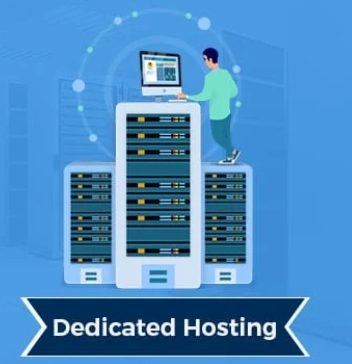A Beginner’s Guide to Hosting: Everything You Need to Know to Start Your Online Presence

In today’s digital age, having an online presence is essential, whether it’s for a personal website, blog, or business. One of the fundamental elements of establishing this presence is choosing the right hosting service. For those who are taking their first steps into the world of hosting, this beginner’s guide will provide a comprehensive overview of the basics and guide you through the crucial decisions to launch your website successfully.
What is Hosting?
To understand hosting, imagine your website as a house and hosting as the land on which it is built. Hosting is essentially the online space where your website’s files are stored, allowing it to be available to visitors at all times.
Types of Hosting:
Shared Hosting: Ideal for beginners, this type of hosting shares resources with other sites on the same server. It’s inexpensive and easy to use.
Dedicated Servers: For larger websites with higher resource requirements, a dedicated server offers all the power of an exclusive server at a higher cost since the resources are not shared as in the previous service (Shared Hosting)
VPS (Virtual Private Servers): It combines the economics of shared hosting with the flexibility of a dedicated server, by allocating exclusive virtual resources.
Domains and Registration:
The domain is the unique address of your website on the internet. Choose a domain name that’s relevant and easy to remember. You can register your domain through your hosting provider or independent services, the most well-known extensions .com, .net, org, there are also extensions in locations such as .com.pe, .com.es, .es, .uk.
Essential Features:
Bandwidth: The amount of data your website can transfer in a given period. Important for sites with a lot of traffic.
Storage: The space where your website’s files are stored. Make sure you have enough space for your present and future needs.
Security: Look for providers that offer strong security measures, such as SSL certificates and malware protection.
Control Panel:
The interface from which you will manage your hosting. cPanel is one of the most popular dashboards because of its simplicity and functionality.
Technical Support:
A good hosting service includes efficient and 24-hour technical support. Make sure your provider offers quick contact and troubleshooting options.
Optimization and Performance:
Learn how to optimize your website to improve loading speed. Not only does this benefit the user experience, but it’s also an important factor for SEO.
Site Migration:
If you already have a website and are considering switching providers, make sure your new host offers seamless migration services.
How to Choose Shared Hosting: for Beginners
When you venture into creating a website, one of the most crucial decisions you’ll face is the choice of hosting service. Among the various options available, shared hosting stands out as a popular choice for those taking their first steps into the digital world. In this detailed guide, we’ll explore the key aspects to consider when choosing shared hosting, ensuring you make an informed and wise decision for your online project.

1. Understanding Shared Hosting:
Shared hosting involves your website sharing resources, such as disk space and processing power, with other sites on the same server. It’s an inexpensive and easy-to-use option, perfect for smaller or early-stage websites.
2. Assess Your Needs:
Before diving into the search for a shared hosting provider, it’s crucial to understand your website’s specific needs. Consider the amount of traffic expected, the resources needed, and the types of files you’ll be handling.
3. Supplier Reliability and Reputation:
Research the reputation and trustworthiness of the hosting provider. Read user reviews and look for reviews online. A provider with a strong reputation is more likely to offer reliable service.
4. Resources and Features Offered:
Check out the resources and features offered by the shared hosting plan. Make sure you have enough disk space, adequate bandwidth, and access to tools like easy-to-use dashboards.
5. Server Performance:
Server performance is key to your website’s speed and accessibility. Make sure the provider has optimized and well-maintained servers to ensure consistent performance.
6. Technical Support Available:
A strong technical support service is essential. Look for a provider that offers 24/7 support through various channels such as live chat, email, or phone.
7. Security and Threat Protection:
Safety is paramount. Make sure the vendor has strong security measures in place, such as firewalls, malware monitoring, and SSL certificates for data encryption.
8. Data Backup Policy:
Check the vendor’s data backup policy. It is important to have regular backups to ensure the recovery of information in case of data loss.
9. Scalability:
Consider future growth. A good shared hosting provider should allow for scalability, allowing you to upgrade your resources as your website grows.
10. Total Cost and Possible Hidden Costs:
Although shared hosting is known for being affordable, it’s critical to understand the total costs and any additional charges. Pay attention to things like rate renewals and potential costs for exceeding resource limits.
How to Choose a Dedicated Server to Power Your Online Project
When your website has reached a level where the demand for resources is significant, it’s time to consider transitioning to a dedicated server. This step is crucial to ensure optimal performance and a seamless user experience. In this detailed guide, we’ll explore the essential aspects to consider when choosing a dedicated server, ensuring you make informed decisions to boost your online presence.

-
Understanding a Dedicated Server:
A dedicated server implies that your website is the sole user of all the server’s resources. This provides full control over the configuration and allows large volumes of traffic and data to be handled efficiently.
-
Specific Needs Assessment:
Before choosing a dedicated server, evaluate the specific needs of your project. Consider the amount of traffic, the resources needed, and any special technical requirements you may have.
-
Hardware Performance:
The quality of the hardware is critical. Research the processing power, amount of RAM, and type of storage the server offers. Opt for servers with high-quality hardware to ensure exceptional performance.
-
Connectivity and Bandwidth:
Check server connectivity and available bandwidth. Make sure your network infrastructure is robust and capable of handling the traffic load your website expects.
-
Technical Support & Maintenance:
A dedicated server may require more advanced technical management. Make sure the vendor offers 24/7 technical support and has a solid reputation in terms of maintenance and updates.
-
Operating System & Control Panel:
Choose the operating system that best suits your needs. Also, check to see if the provider offers an easy-to-use control panel to simplify your server management.
-
Safety and Security:
Safety is paramount. Make sure the dedicated server includes security measures such as firewalls, threat monitoring, and possibly managed security services.
-
Endorsement Policy:
The backup policy is crucial for data recovery in the event of failures. Make sure the provider has a strong backup policy, and consider making additional backups on a regular basis.
- Scalability and Future Growth:
Opt for a server that allows for scalability to accommodate the future growth of your project. The ability to add additional resources as needed is essential.
- Costs and Contract:
Fully understand the cost structure. Consider not only the upfront costs, but also the monthly costs and any additional charges. Read the terms of the contract carefully to avoid any unpleasant surprises.
How to Choose a VPS to Optimize Your Website
In today’s competitive digital world, choosing a web host is a critical decision to ensure your site’s performance, speed, and accessibility. Virtual Private Servers (VPS) offer an intermediate solution between shared hosting and dedicated servers, providing flexibility and dedicated resources. In this SEO guide, we’ll explore the key aspects to consider when choosing a VPS, ensuring that your choice not only improves your site’s performance but also its search engine visibility.

-
Understanding the SEO Benefits of a VPS:
A VPS provides dedicated resources and greater control over server configuration, resulting in better performance and faster load times. These factors are crucial for SEO, as search engines favor fast and responsive sites.
-
Assessing Specific Needs:
Before selecting a VPS, understand the specific needs of your site. Evaluate the expected traffic, the resources required, and any specific applications or software that may influence your server choice.
-
Hardware Performance and Resources:
Opt for a VPS that offers solid resources, such as a significant amount of RAM, processing power, and SSD storage. Hardware performance has a direct impact on the speed and efficiency of your website.
-
Server Location:
The physical location of the server can affect the loading speed of your website. Choose a geographic location that’s close to your core audience to minimize latency and improve the user experience, a key factor for SEO.
-
Scalability:
The ability to scale is critical. A good VPS provider should allow you to increase or decrease resources based on your site’s changing needs without significant disruption.
-
Operating System & Control Panel:
Select the operating system that best suits your needs and technical preferences. Make sure your VPS includes a user-friendly control panel to make server management easier.
-
Security and SSL Certificates:
Security is essential for SEO. Verify that the VPS provider implements strong security measures and offers options for SSL certificate installation, which is beneficial for both security and search engine rankings.
-
24/7 Technical Support:
Accessible and available 24-hour technical support is crucial. Technical issues can arise at any time, and a quick response is essential to minimize the impact on your site and your SEO rankings.
-
Data Backup:
Make sure the provider has a clear data backup policy. Regular backups are essential for data recovery in the event of loss.
-
Costs and Contract:
Fully understand the cost structure, including monthly fees, potential additional charges, and the terms of the contract. Evaluate whether the investment in a VPS aligns with the benefits it will bring to your site and its SEO performance.
You should choose a VPS that boosts not only your site’s performance but also its visibility in search engines. Choosing the right VPS will contribute significantly to improving your SEO rankings, providing a solid foundation for the continued success of your online presence. Optimize your website and make it stand out in search results!
Perfect Domain & Best Registration Companies
When you embark on the exciting journey of building your online presence, choosing your domain is a critical step. This will be your identity on the web, so it’s crucial to select a unique and memorable name. Additionally, finding the right domain registration company is essential to ensure a smooth process and reliable support. In this guide, we’ll explore how to choose the perfect domain and highlight some of the best registry companies available.

Choosing the Perfect Domain:
Relevance and Memorability:
Opt for a name that is relevant to your content or brand.
Look for something memorable so visitors can easily remember it.
Simplicity and Clarity:
Avoid complicated or hard-to-spell names.
Clarity is key; Your domain should clearly reflect the purpose of your site.
Length and Avoid Confusing Abbreviations:
Keep the domain short and easy to type.
Avoid abbreviations that can cause confusion.
Availability Research:
Check domain availability using domain lookup tools.
Make sure the name you choose doesn’t infringe on trademark rights.
SEO:
Consider including relevant keywords in your domain to improve SEO.
Avoid hyphens and numbers unless they’re essential to your brand.
Featured Domain Registration Companies:
Namecheap:
It offers competitively priced domains.
User-friendly interface and reliable customer service.
GoDaddy:
Widely recognized and with a wide variety of domain extensions.
Additional tools like website builder and hosting.
Bluehost:
Known for its hosting services, it also offers domain registration.
Ideal if you plan to host your website with them.
Google Domains:
Clean and simple interface.
Easy integration with other Google services.
Name.com:
It offers a variety of domain extensions.
Domain management tools and helpful support.
Steps to Register Your Domain:
How to choose your Domain Provider?
Research the options and select a reliable registration company.
Check Availability:
Use the search tool on the provider’s site to confirm that your desired domain is available.
Select the Extension:
Consider popular options like .com, .net, or .org, but also explore extensions specific to your industry or country.
Add Additional Services if Needed:
Some providers offer additional services such as domain privacy or SSL certificates. Decide if you need them and add them as needed.
Complete the Payment Process:
Enter your payment information securely and complete the registration process.
Configure in Domain:
Once registered, configure the DNS settings and any other necessary details.
